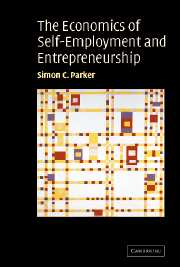Book contents
- Front Matter
- Contents
- List of Figures
- List of Tables
- Preface
- Glossary of commonly used symbols
- 1 Introduction
- Part I Entrepreneurship: theories, characteristics and evidence
- Part II Financing entrepreneurial ventures
- 5 Debt finance for entrepreneurial ventures
- 6 Other sources of finance
- 7 Evidence of credit rationing
- Part III Running and terminating an enterprise
- Part IV Government policy
- References
- Author index
- Subject index
7 - Evidence of credit rationing
Published online by Cambridge University Press: 22 September 2009
- Front Matter
- Contents
- List of Figures
- List of Tables
- Preface
- Glossary of commonly used symbols
- 1 Introduction
- Part I Entrepreneurship: theories, characteristics and evidence
- Part II Financing entrepreneurial ventures
- 5 Debt finance for entrepreneurial ventures
- 6 Other sources of finance
- 7 Evidence of credit rationing
- Part III Running and terminating an enterprise
- Part IV Government policy
- References
- Author index
- Subject index
Summary
Chapter 5 set out the theoretical arguments for and against credit rationing, where rationing may be of loan sizes (Type I rationing) or the number of loans (Type II rationing). That chapter concluded that theory alone cannot determine whether credit rationing exists and how widespread it might be in practice. Empirical evidence on these issues comprises the content of the present chapter.
The chapter is divided into three parts. Section 7.1 chronicles tests of Type I credit rationing. After introducing the influential paper by Evans and Jovanovic (1989), we survey the empirical literature. Most of its contributions are predicated on econometric estimates of a relationship between self-employment participation and personal wealth. Section 7.2 provides a critique of this methodology. Section 7.3 treats the empirical literature on Type II credit rationing. As in chapter 5, we concentrate on tests of equilibrium credit rationing, not ‘temporary’ or disequilibrium credit rationing, arising from a temporary excess demand for credit while banks adjust their interest rates. Reflecting the emphasis in published research to date, the evidence discussed below focuses on developed economies. The causes and effects of credit rationing in developing countries tend to be highly country-specific: see, e.g., Levy (1993) and Kochar (1997).
At the outset we reiterate a point made in chapter 1: that claims by survey respondents should be treated with great caution. In the present context, these are claims that they face credit rationing.
- Type
- Chapter
- Information
- The Economics of Self-Employment and Entrepreneurship , pp. 179 - 190Publisher: Cambridge University PressPrint publication year: 2004



